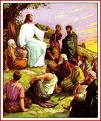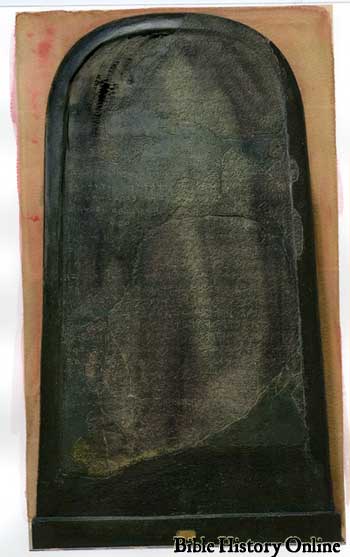|
BACKGROUND
Sermon on the mount.
SERMON ON THE MOUNT.
|
Online links to scriptures (New International Version [NIV] unless otherwise stated) are shown in blue
| An Eye for an Eye
38 “You have heard that it was said, ‘Eye for eye, and tooth for tooth.’ 39 But I tell you, Do not resist an evil person. If someone strikes you on the right cheek, turn to him the other also. |
|
|
| 40 And if someone wants to sue you and take your tunic, let him have your cloak as well. 41 If someone forces you to go one mile, go with him two miles. |
|
|
| 42 Give to the one who asks you, and do not turn away from the one who wants to borrow from you. (Matthew 5:38-42) |
|
|
| EXPOSITION: |
|
 This is a change from the Old Testament law of retaliation. There, the decisions were only meant to be applied by a magistrate, and except in the case of murder, a monetary compensation could be substituted. However, by the time of Jesus this law was being misinterpreted, to wrongly allow individuals to take the law into their own hands. This is a change from the Old Testament law of retaliation. There, the decisions were only meant to be applied by a magistrate, and except in the case of murder, a monetary compensation could be substituted. However, by the time of Jesus this law was being misinterpreted, to wrongly allow individuals to take the law into their own hands.
In essence, Jesus is teaching us two things here.
1. We must not seek revenge from those who hurt us.
2. We must only not hurt our neighbours, but seek to do them good at all times.
|
| TESTIMONY: |
|
 We have a legal system! We have rights! (In fact today, we are taught our rights but not our responsibilities!) Surely then, we should use them to get justice for ourselves? We have a legal system! We have rights! (In fact today, we are taught our rights but not our responsibilities!) Surely then, we should use them to get justice for ourselves?
Not according to Jesus!
Forgiveness is a hard lesson for all of us to learn. Some say 'revenge is sweet', but what I have observed is that the desire for revenge leads to bitterness which remains, even when revenge is obtained!
|
|
|
 Bitterness eats away our soul like a voracious cancer. Forgiveness, on the other hand, is a soothing balm to the soul. Bitterness eats away our soul like a voracious cancer. Forgiveness, on the other hand, is a soothing balm to the soul.
But our human nature screams out for revenge when we are hurt. That is our immediate reaction, both mine and yours, when we are wronged.
To not hold grudges, is something I have had to learn over the years of my walk with Jesus. This is particularly true with other Christians and in the church, where many are hurt the most!
I remember one occasion where I was accorded a position by a denominational grouping, not at my request, but which was then protested and revoked by my local pastor, as I had not done the formal training and filled in the proper paperwork.
When my pastor told me, I was graceful about it, and he commented that I took it very well. Of course I learned a lesson from it, but have not held any grudge. And I have an inner peace about it that I could not have had, had I become bitter about a perceived injustice.
|
|
|
 Often, those closest to us hurt us the most. One Saturday night I was at a meeting where the speaker, one of New Zealand's more prominent pastors, talked of a recent experience where his daughter had offended him greatly. He wanted her to apologise and she wouldn't. He got bitter about it and it starting affecting his enthusiasm for ministry. Often, those closest to us hurt us the most. One Saturday night I was at a meeting where the speaker, one of New Zealand's more prominent pastors, talked of a recent experience where his daughter had offended him greatly. He wanted her to apologise and she wouldn't. He got bitter about it and it starting affecting his enthusiasm for ministry.
Finally, in a meeting in our neighboring country of Australia (yes - some good things come out of Australia! [Just friendly Kiwi - Aussie rivalry! Don't worry I am not getting bitter!]), the speaker had a word of prophecy directly for him as he sat far away, up in the balcony, "Love the one who has wronged you." Not exactly what he wanted to hear! But his enthusiasm immediately returned! He came home, took his daughter back into their home and simply loved her. Within a week she had apologised to all the family for her actions.
Not all cases work out as well as this, but even if she hadn't expressed forgiveness, the pastor himself was back in the place where his ministry could regain its effectiveness.
Yes bitterness can happen to anyone at any time.
|
|
|
"Lord may I be open and responsive to your wisdom in my dealings with others."
|
| Love for Enemies
43 “You have heard that it was said, ‘Love your neighbor and hate your enemy.’ 44 But I tell you: Love your enemies and pray for those who persecute you, 45 that you may be sons of your Father in heaven. |
|
|
| He causes his sun to rise on the evil and the good, and sends rain on the righteous and the unrighteous. 46 If you love those who love you, what reward will you get? Are not even the tax collectors doing that? |
|
|
| 47 And if you greet only your brothers, what are you doing more than others? Do not even pagans do that? 48 Be perfect, therefore, as your heavenly Father is perfect. (Matthew 5:43-48) |
|
|
| EXPOSITION: |
|
 This is an exposition of the true meaning of the fundamental law, 'love thy neighbour'. The Jews had incorrectly, according to the Law, come to the understanding that loving their Jewish neighbour was different to loving their enemies in the area, eg Samaria, or country, eg Egypt, next door. They had fought with these people for centuries and now Jesus was reminding and telling them, and us, to love our enemies! This is an exposition of the true meaning of the fundamental law, 'love thy neighbour'. The Jews had incorrectly, according to the Law, come to the understanding that loving their Jewish neighbour was different to loving their enemies in the area, eg Samaria, or country, eg Egypt, next door. They had fought with these people for centuries and now Jesus was reminding and telling them, and us, to love our enemies!
Jesus realised that this would be the ultimate challenge, hence the call to perfection.
|
| TESTIMONY: |
|
 I am of a generation born after World War 2, living in an island nation that has had no real human enemies during my lifetime. While we have been caught up in other people's wars, our army has consisted solely of volunteers, not conscripts. Therefore personally, I have not experienced war. I appreciate that this may be different for you. So I cannot honestly testify in that area. I am of a generation born after World War 2, living in an island nation that has had no real human enemies during my lifetime. While we have been caught up in other people's wars, our army has consisted solely of volunteers, not conscripts. Therefore personally, I have not experienced war. I appreciate that this may be different for you. So I cannot honestly testify in that area.
Inevitably, in the course of life, particularly if we are ones who stand up for principles, and do things, rather than simply go with the flow, we are likely to offend, indeed anger, others. Sadly, it is a fact of life that relationships do break down from time to time. This is particularly hurtful when it is with those whom we have previously been close to. 'Family feuds' are classic cases of this.
|
|
|
 In our church family too, disagreements easily grow out of control, the devil sticking in and twisting his knife with great glee in order to separate and alienate God's people. And we, all too often, are willing targets! Friends become enemies, all in the name of 'religion' or 'theology'. Certainly not in the name of Jesus! In our church family too, disagreements easily grow out of control, the devil sticking in and twisting his knife with great glee in order to separate and alienate God's people. And we, all too often, are willing targets! Friends become enemies, all in the name of 'religion' or 'theology'. Certainly not in the name of Jesus!
While hatred has never been a particular trait of mine, lack of love certainly has. Interestingly, I have learned that enemies in the personal area are largely created by my actions, not theirs. An enemy becomes an enemy only when we allow them to be one.
For sure people may hate us, but if we react to them in love rather than respond in like manner, their hatred is likely to be challenged. Hatred builds hatred. While we might hate peoples actions we are to love the people. Unfortunately, when we rightfully stand on moral principles, we too often condemn the person as well. And hatred develops.
Homosexuality is an example of this. I do understand that people will attempt to vilify us for our stand, but the ideal of Jesus, expressed here, is that our reaction is not to match theirs, but rather, still to be as Jesus to them. Even when we are misunderstood. As Jesus well understood, this is particularly hard to do. Hence His perfection comments.
It is hard for us not to let hatred affect us. I have had a family experience of this. My father (unwittingly) became one of the leaders of the anti-homosexual lobby at the time of the bill to legalise homosexuality in New Zealand. Undoubtedly, the criticism and undeserved hatred he received shortened his life.
None has reached perfection yet (if we had we would not die!) so we are all 'work in progress' in this area.
|
|
|
Lord, give us the revelation and will to love our enemies, for we cannot do it in our own strength.
|
| <i>NEXT WEEK:</i> SERMON ON THE MOUNT continues...
|
|
 ..... looking at 'giving to the needy'. ..... looking at 'giving to the needy'.
|
| A NOTE FROM DAVID |
|
 The teaching of Jesus is so different to the inclinations of our natural nature that to live it at all times is just so hard for us, isn't it? The teaching of Jesus is so different to the inclinations of our natural nature that to live it at all times is just so hard for us, isn't it?
However, as we mature in Christ, our lives can, and do, change to become more like His.
Thank you Lord.
BIBLICAL ARCHAEOLOGY
THE MOABITE STONE
The Moabite Stone also known as the Mesha Stele is an interesting story. The Bible says in 2 Kings 3:5 that Mesha the king of Moab stopped paying tribute to Israel and rebelled and fought against Israel and later he recorded this event. This record from Mesha has been discovered.
The Moabite Stone was discovered in 1868 in Moab, at Dibon, 20 miles east of the Dead Sea. It was actually discovered by a German Missionary named F.A. Klein. It is a black and blue basalt stone standing 4 feet high, 2 feet wide and 14 inches thick. It was purchased for a large sum of money by the French Consulate in Jerusalem. It is interesting that the local Arabs believed that it contained a treasure and therefore broke it in large pieces by lighting it on fire and then pouring cold water over it. The inscription is summarized with these words:
"I Mesha, king of Moab, made this monument to Chemosh, to commemorate deliverance from Israel. My father reigned over Moab 30 years, and I reigned after my father. Omri, king of Israel oppressed Moab many days, and his son (Ahab) after him. But I made war against the king of Israel and drove him out, and took his cities, Medeba, Ataroth, Nebo, and Jahaz, which he built while he waged war against me. I destroyed his cities, and devoted the spoil to Chemosh, and the women and girls to Ashtar. I built Qorhah with prisoners from Israel."
The Moabite Stone discovery is important in the study of Biblical Archaeology. It is the actual record of Mesha, king of Moab rebelling against the king of Israel. This stone is one of the places where Israel is mentioned in ancient times outside of the Bible.
"And Mesha king of Moab was a sheepmaster, and rendered unto the king of Israel an hundred thousand lambs, and an hundred thousand rams, with the wool. But it came to pass, when Ahab was dead, that the king of Moab rebelled against the king of Israel." - 2 Kings 3:4-5
Size and Description
Language: Moabite (a West Semitic Language)
Medium: basalt (black-bluish) stone stele
Size: 1.15 meters high 60-68 centimeters wide
Length: 39 lines of writing
Honoree: Mesha, king of Moab (late 9th century BCE)
Approximate Date: 830 BCE
Place of Discovery: Dhiban [in modern Jordan]
Date of Discovery: 1868
Current Location: Louvre Museum (Paris, France)
Inventory number: AO 5066
Scource: http://www.bible-history.com
|
So until next week.......
MAY GOD BLESS YOU AND YOU BLESS GOD!
His servant and yours

Learn more about us at...
www.wwj.org.nz/about.php
|
A DAVID'S DOODLING
583. Forgiveness is the healing balm of life.
David Tait
|
Check
out the WWJ website for….
More David's Doodlings: www.wwj.org.nz/dd.php
Just jokes: http://www.wwj.org.nz/jokes.php
Waxing Lyrical: http://www.wwj.org.nz/waxing.php
If Only I'd Thought of it: http://www.wwj.org.nz/thought.php
Laughing at Ourselves: http://www.wwj.org.nz/laugh.php
|

 This is a change from the Old Testament law of retaliation. There, the decisions were only meant to be applied by a magistrate, and except in the case of murder, a monetary compensation could be substituted. However, by the time of Jesus this law was being misinterpreted, to wrongly allow individuals to take the law into their own hands.
This is a change from the Old Testament law of retaliation. There, the decisions were only meant to be applied by a magistrate, and except in the case of murder, a monetary compensation could be substituted. However, by the time of Jesus this law was being misinterpreted, to wrongly allow individuals to take the law into their own hands. We have a legal system! We have rights! (In fact today, we are taught our rights but not our responsibilities!) Surely then, we should use them to get justice for ourselves?
We have a legal system! We have rights! (In fact today, we are taught our rights but not our responsibilities!) Surely then, we should use them to get justice for ourselves? Bitterness eats away our soul like a voracious cancer. Forgiveness, on the other hand, is a soothing balm to the soul.
Bitterness eats away our soul like a voracious cancer. Forgiveness, on the other hand, is a soothing balm to the soul.  Often, those closest to us hurt us the most. One Saturday night I was at a meeting where the speaker, one of New Zealand's more prominent pastors, talked of a recent experience where his daughter had offended him greatly. He wanted her to apologise and she wouldn't. He got bitter about it and it starting affecting his enthusiasm for ministry.
Often, those closest to us hurt us the most. One Saturday night I was at a meeting where the speaker, one of New Zealand's more prominent pastors, talked of a recent experience where his daughter had offended him greatly. He wanted her to apologise and she wouldn't. He got bitter about it and it starting affecting his enthusiasm for ministry.  This is an exposition of the true meaning of the fundamental law, 'love thy neighbour'. The Jews had incorrectly, according to the Law, come to the understanding that loving their Jewish neighbour was different to loving their enemies in the area, eg Samaria, or country, eg Egypt, next door. They had fought with these people for centuries and now Jesus was reminding and telling them, and us, to love our enemies!
This is an exposition of the true meaning of the fundamental law, 'love thy neighbour'. The Jews had incorrectly, according to the Law, come to the understanding that loving their Jewish neighbour was different to loving their enemies in the area, eg Samaria, or country, eg Egypt, next door. They had fought with these people for centuries and now Jesus was reminding and telling them, and us, to love our enemies!  I am of a generation born after World War 2, living in an island nation that has had no real human enemies during my lifetime. While we have been caught up in other people's wars, our army has consisted solely of volunteers, not conscripts. Therefore personally, I have not experienced war. I appreciate that this may be different for you. So I cannot honestly testify in that area.
I am of a generation born after World War 2, living in an island nation that has had no real human enemies during my lifetime. While we have been caught up in other people's wars, our army has consisted solely of volunteers, not conscripts. Therefore personally, I have not experienced war. I appreciate that this may be different for you. So I cannot honestly testify in that area. In our church family too, disagreements easily grow out of control, the devil sticking in and twisting his knife with great glee in order to separate and alienate God's people. And we, all too often, are willing targets! Friends become enemies, all in the name of 'religion' or 'theology'. Certainly not in the name of Jesus!
In our church family too, disagreements easily grow out of control, the devil sticking in and twisting his knife with great glee in order to separate and alienate God's people. And we, all too often, are willing targets! Friends become enemies, all in the name of 'religion' or 'theology'. Certainly not in the name of Jesus! ..... looking at 'giving to the needy'.
..... looking at 'giving to the needy'.  The teaching of Jesus is so different to the inclinations of our natural nature that to live it at all times is just so hard for us, isn't it?
The teaching of Jesus is so different to the inclinations of our natural nature that to live it at all times is just so hard for us, isn't it?